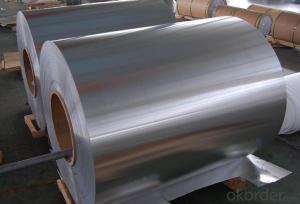Hot Rolled Aluminum Coil for Cans Bright Surface
- Loading Port:
- Shanghai
- Payment Terms:
- TT OR LC
- Min Order Qty:
- 5 m.t.
- Supply Capability:
- 5000 m.t./month
OKorder Service Pledge
OKorder Financial Service
You Might Also Like
l Product Description
Specification:
Hot Rolled Aluminium coil | ||||||||||||||||
Aluminium Coils, non-alloy and alloy products have many different applications, they are used windly throughout construction, building, decoration, lighting, metal nameplate, aircraft and aerospace structures, etc. | ||||||||||||||||
Specification | ||||||||||||||||
ALLOY | TEMPER | THICKNESS | WIDTH(mm) | LENGTH(mm) | ||||||||||||
1050,1060,1070, | O,F, H12, 114,H18,H22, H24,H26,H32, H34,H36,H111, | 3.0-10.0 | 1000--1500mm | in Coil | ||||||||||||
chemical composition | ||||||||||||||||
Alloy | Si | Fe | Cu | Mn | Mg | Cr | Ni | Zn | Ca | V | Ti | Other | Min.Al | |||
1050 | 0.25 | 0.40 | 0.05 | 0.05 | 0.05 | - | - | 0.05 | - | 0.05 | 0.03 | 0.03 | 99.50 | |||
1060 | 0.25 | 0.35 | 0.05 | 0.03 | 0.03 | - | - | 0.05 | - | 0.05 | 0.03 | 0.03 | 99.60 | |||
1070 | 0.20 | 0.25 | 0.04 | 0.03 | 0.03 | - | - | 0.04 | - | 0.05 | 0.03 | 0.03 | 99.70 | |||
1100 | 0.95 | 0.05-0.2 | 0.05 | - | - | - | 0.10 | - | - | - | 0.05 | 99.00 | ||||
3003 | 0.60 | 0.70 | 0.5-0.2 | 1.0-1.5 | - | - | - | 0.10 | - | - | - | 0.15 | 96.95-96.75 | |||
3004 | 0.30 | 0.70 | 0.25 | 1.0-1.5 | 0.8-1.3 | - | - | 0.25 | - | - | - | 0.15 | 96.55-95.55 | |||
l Packaging & Delivery
Packaging detail: Standard seaworthy exporting carton, Wooden
pallets, waterproof paper and plastic coverage or or
as customer's requirements
Delivery detail: about 25 days from received oiginal L/C or advance
payment
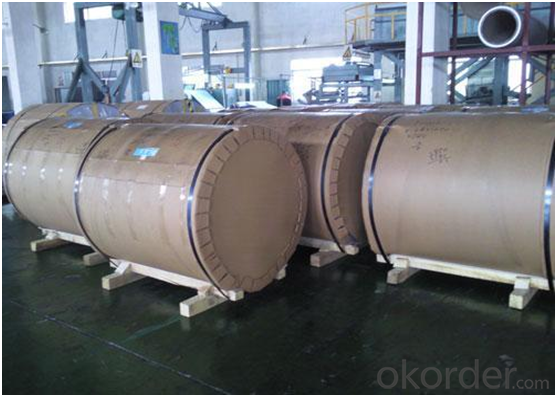
l Company Profile
CNBM International Corporation, China National Building Materials (Group) Corporation, is one of the largest companies in China building material & equipment industry, with 42,800 employees and sales in 2005 of US Dollar 4.395 billion. In 2006, China National Building Material Company Limited was listed on Hong Kong Stock Market with the stock code as 3323.
The business scope of CNBM covers from manufacturing and sales of a series of building materials to scientific research and design, import and export trade. In many of these fields, CNBM is playing the leading role.
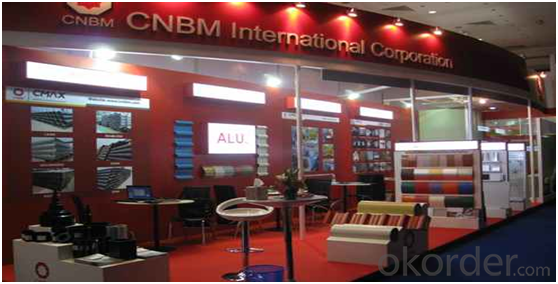
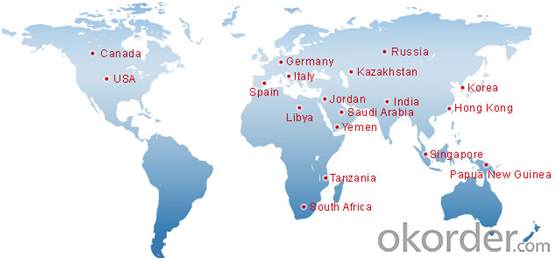
l Product Images
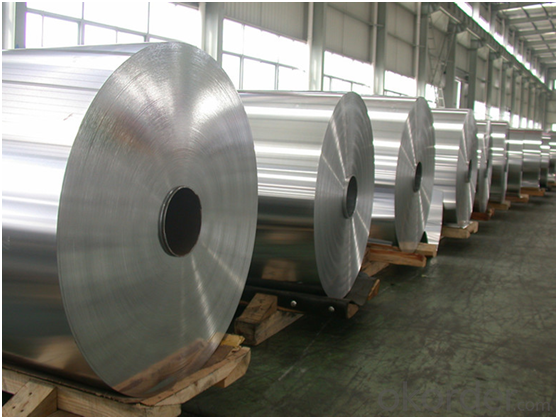
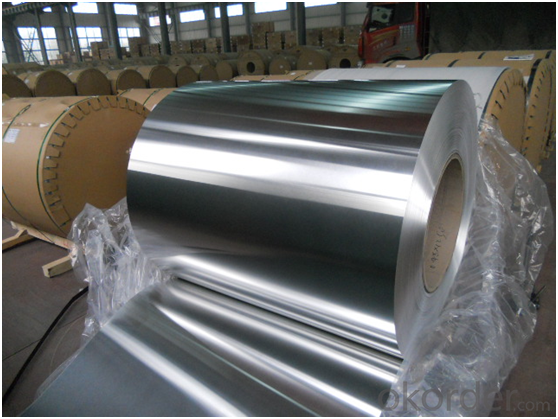
l FAQ
Q: Do you provide free samples?
A: Yes, free samples will be sent to you on freight at destination.
Q: Can I get your latest products catalogue?
A: Yes, it will be sent to you in no time.
Q: What is the MOQ?
A: 5 tons
Q: What are your payment terms?
A: We accept L/C, T/T.
l Contact us
Email:service@okorder.com
- Q:my text says aluminium does not corrode much as a passive aluminium oxide layer is formed on it.Well other metals such as sodium adn potassium also form oxides. Why dont their oxides prevent further oxidation ?
- sodium oxide and potassium oxide are water soluble aluminium oxide is not water soluble. the layer formed of oxide on the aluminium surface is coherent and adherent with no pores and stuck to the metal surface. the layer is also passive to most acids and alkalies except HCl and anti passive ions if present. sodium oxide and potassium oxide dissolve in any aqueous medium forming the corresponding alkalies NaOH and KOH leaving the fresh metal surface exposed to more corrosion. also the reaction of Na and K with aqueous media like water and acids is quite vigorous and fast unlike aluminium which is mu less reactive
- Q:Aluminum coil Kaiping is out of arc plate, what's the matter?
- Aluminum coil Kaiping need to use "stretch bending straightening machine" to do leveling, before they can be leveled
- Q:Are aluminum coils suitable for insulation jacketing?
- Yes, aluminum coils are suitable for insulation jacketing. Aluminum is a popular choice for jacketing material due to its excellent thermal properties, durability, and corrosion resistance. It is widely used in various industries, including HVAC, oil and gas, and petrochemical, for insulating pipe systems and equipment. Aluminum coils provide a protective covering around insulation materials, preventing moisture ingress and maintaining thermal efficiency. Additionally, their lightweight nature makes them easy to install and transport. Overall, aluminum coils are a reliable and effective solution for insulation jacketing applications.
- Q:Hey everybody I'm trying to improve the performance of my vintage metal Coleman cooler I just got. To test it I filled it up with water bottles and 5lbs of cubed ice from Stop and Shop and left it in the closet with the dorm's AC set to 65. When I got back 28 hours later the ice was completely melted. The water still kept the drinks cool for several days after that, but I'm frustrated that the ice melted in a single day.
- Aluminum foil has zero R factor (insulation factor). However, if it put on the outside of a cooler it will reflect the sun rays away from the cooler, and make it easier for your cooler to keep things cool. Gel packs are slightly better than extra ice (depending on the amount/concentration of glycol alcohol in them) -- gel packs are popular because they are self contained and not as wet and messy as melted ice. Edit: Well, indoors the aluminum would not be a complete waist. Heat waves from inside the house would still bounce off the aluminum. But the other answerer mentioned a very good way to further insulate your cooler. Just attach (tape or glue) stryrofoam sheets to the outside of your cooler == that would be a big time improvement.
- Q:Why the aluminum sheet crack after?
- Maybe the crack existed during welding but you didn’t notice. And then it expands and becomes obvious when acted on by external force in circling process. The reason may be the welding craft. Besides, I suggest more comprehensive tests after welding, such as penetrant test.
- Q:Are aluminum coils compatible with different joining methods?
- Different joining methods can be used with aluminum coils. Aluminum, a versatile metal, can be joined using techniques like welding, brazing, soldering, and mechanical fastening. The choice of method depends on the specific application and desired joint properties. To join aluminum coils, welding is commonly used as it creates a strong and durable bond. Various welding techniques, such as MIG, TIG, and resistance welding, can be employed based on the thickness and alloy type. Brazing is another effective method for joining aluminum coils. It involves heating a filler material with a lower melting point than the base metal to create a strong joint. Brazing is suitable when joining aluminum coils with dissimilar metals. For thin aluminum coils or when a lower temperature method is necessary, soldering is a suitable option. It involves melting a low-temperature alloy (solder) to join the coils together. Soldering finds common use in electronics and plumbing applications. Mechanical fastening methods like bolts, screws, rivets, or clips can also be used to join aluminum coils. These methods provide a reliable and removable joint, making them appropriate for applications requiring disassembly. In conclusion, different joining methods, including welding, brazing, soldering, and mechanical fastening, can be used with aluminum coils. The choice depends on factors like the application, alloy type, and desired joint properties.
- Q:What are the potential applications of colored aluminum coils?
- Colored aluminum coils have a wide range of potential applications. They can be used in the construction industry for cladding, roofing, and facades, adding aesthetic appeal to buildings. In the automotive industry, colored aluminum coils can be used for interior and exterior trim, giving vehicles a sleek and modern look. They can also be utilized in electronics for manufacturing casings and decorative elements. Additionally, colored aluminum coils have applications in the signage and advertising industry, as well as in the production of household appliances, furniture, and decorative items.
- Q:Can aluminum coils be used in the production of automotive heat shields?
- Yes, aluminum coils can be used in the production of automotive heat shields. Aluminum is commonly used in heat shields due to its excellent thermal conductivity and lightweight properties. It helps to effectively dissipate and reflect heat, making it a suitable material for this application.
- Q:Can aluminum coils be used in the production of aluminum siding?
- Aluminum siding production can indeed utilize aluminum coils. The manufacturing process of aluminum siding frequently incorporates aluminum coils due to their robustness, lightweight composition, and resistance to corrosion. Typically, these coils undergo processing via a coil coating line, where they receive a protective layer to enhance both functionality and visual appeal. After coating, the aluminum coils are shaped and molded into the desired siding panels, which can subsequently be employed in residential or commercial structures. Aluminum siding is highly favored for its minimal upkeep needs, long lifespan, and capacity to endure diverse weather conditions.
- Q:Can aluminum coils be used in power generation facilities?
- Yes, aluminum coils can be used in power generation facilities. Aluminum is a highly conductive material that offers several advantages for power generation applications. It has excellent thermal conductivity, meaning it can efficiently transfer heat away from the coils, which is crucial for cooling systems in power generation facilities. Additionally, aluminum is lightweight, making it easier to handle and install compared to other metals like copper. This lightweight property also reduces the overall weight of the equipment, resulting in cost savings. Furthermore, aluminum is corrosion-resistant, which is important for power generation facilities that often operate in harsh environments. Overall, aluminum coils are a viable option for power generation facilities due to their conductivity, thermal efficiency, lightweight nature, and corrosion resistance.
1. Manufacturer Overview |
|
|---|---|
| Location | |
| Year Established | |
| Annual Output Value | |
| Main Markets | |
| Company Certifications | |
2. Manufacturer Certificates |
|
|---|---|
| a) Certification Name | |
| Range | |
| Reference | |
| Validity Period | |
3. Manufacturer Capability |
|
|---|---|
| a)Trade Capacity | |
| Nearest Port | |
| Export Percentage | |
| No.of Employees in Trade Department | |
| Language Spoken: | |
| b)Factory Information | |
| Factory Size: | |
| No. of Production Lines | |
| Contract Manufacturing | |
| Product Price Range | |
Send your message to us
Hot Rolled Aluminum Coil for Cans Bright Surface
- Loading Port:
- Shanghai
- Payment Terms:
- TT OR LC
- Min Order Qty:
- 5 m.t.
- Supply Capability:
- 5000 m.t./month
OKorder Service Pledge
OKorder Financial Service
Similar products
New products
Hot products
Related keywords
